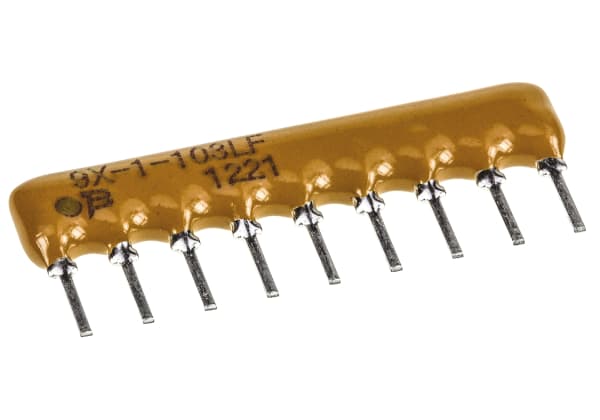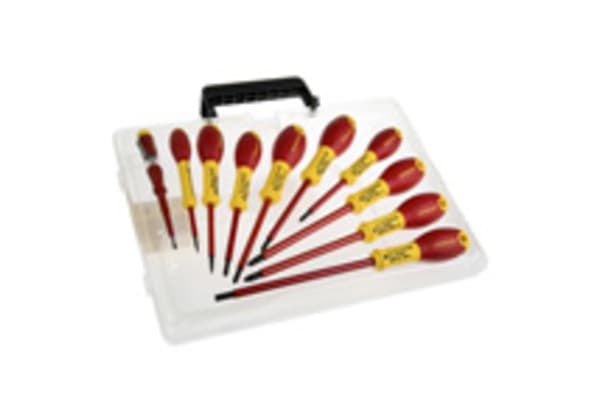- Published 17 Jan 2023
- Last Modified 29 Aug 2023
- 8 min
A Complete Guide to Potentiometers
Our potentiometers guide will help you understand their uses, how they work, the various types and characteristics.

What is a Potentiometer?
A potentiometer is a type of variable resistor. These passive components are designed to control electrical resistance, measured in Ohms (Ω). Multiple different variations are available, including trimmer and rotary potentiometers, but the functional principle remains the same.
Potentiometers work by picking up an input Voltage and transferring different amounts to a circuit. This amount is determined by the position of the wiper (sometimes also known as a slide) on a resistive track. This explanation briefly describes how potentiometers can be used as voltage regulators, but they can also be used to introduce different levels of resistance, to compare the electromotive force (EMF) of two cells, or to regulate the power in a circuit. In the latter case, it is a rheostat.
A typical example of a potentiometer application is the volume control on radio and stereo systems. Some still have analogue rotary potentiometers installed and despite increasing digitalisation, potentiometers are often used in electronics like these.
Potentiometers may also be referred to as pots or potmeters.
Potentiometer Uses
Potentiometers are often used in various devices, in both industrial and consumer applications. Some common uses of potentiometers include:
- Mechanical rotary encoders for simple speed adjustment
- Comparing the EMF of a standard cell and a battery cell
- Controlling the electrical properties of various devices such as oscillators
- Volume control in audio equipment
- Balancing or readjusting the resistance value to avoid undesirable changes
It should be noted that potentiometers can do more than just regulate resistance. For instance, they can be used as polarity converters. In this application, it is connected to two different direct current sources. The positive and negative terminals are connected on one side of the potentiometer in the + / - pattern, and the opposite on the other side. This means that the zero point is exactly in the middle. One use for this functionality is in the balance controls of audio systems.
Pots are also ideal for use with adjustment devices that require highly precise resistance values.
How Does a Potentiometer Work?
Potentiometers essentially consist of three main components - a resistive element, the wiper, and three terminals. Two of the terminals are for the resistive strip and the wiper (the middle pin). Inside, the two outermost connection terminals are wired to the resistive element. This is usually wirewound and made of a material such as conductive plastic, carbon, or cermet.
The wiper contacts the Ohmic component via the terminals. The wiper is a sliding contact and if it is moved along the track, the current flowing through the circuit changes. With mechanical trimmer potentiometers, this is achieved using a rotary switch, slide or screw.
The divided Voltage is generated at the third connection terminal. For example, if 16V is applied and the potentiometer is fully adjusted to the positive contact, the third contact supplies the entire Voltage. However, if the potentiometer is set exactly between the positive and negative lines, the third connection terminal only has 8V - half of the Voltage potential. If the potentiometer is aligned with the negative connection terminal, the output potential is zero. It should be noted that these features only apply to potentiometers with a linear taper so do not apply to all variations.
Digital Potentiometers
Digital potentiometers use Field Effect Transistors (FETs) to control the flow of current. The resistor consists of several individual steps, which are determined by the number of position of the transistors. This contrasts with analogue or mechanical potentiometers, which use a mechanical resistor.
Digital potentiometers typically offer more advantages than their analogue counterparts. For instance, they can be controlled with a digital input rather than manually needing to adjust a slide. Some digital potentiometers are volatile, meaning that they revert to a certain position as soon as they are switched off or disconnected from the mains. Digital versions are also resistant to shock and vibration unlike mechanical potentiometers, where movement could cause the wiper position to change. Lastly, digital models are advantageous as they can only be set by users able to access both the equipment and the programming interface.
Potentiometer Symbol
The diagram to the left shows the standard symbol for a potentiometer as it would appear in a schematic.
The design is straightforward - a simple augmentation of the standard resistor symbol. As potentiometers have three terminals, the arrow represents the third terminal (the wiper).
Potentiometer Diagram
The diagram to the right shows the role of a potentiometer in a circuit.
The potmeter acts as an adjustable voltage divider, varying the wiper's position across the resistive material. The full input Voltage is applied across the resistor's length. As shown by the circuit diagram, the output Voltage is the Voltage drop - if any - between the fixed and sliding contact.
Potentiometer Types
Different types of potentiometers are intended for specific applications and environments. For instance, some industrial, heavy-duty models must be able to withstand extreme temperatures up to 150°C.
Some of the most common potentiometer types are outlined below:
Linear Potentiometer
With linear potentiometers, the Voltage always changes linearly in constant steps depending on the rotation of the control unit and the location of the wiper on the resistive component. This type is commonly used in application like light dimmer switches.
Rotary Potentiometer
Rotary potentiometers are designed for simple control via turning a knob or spindle. They can be either single turn or multi-turn, depending on the specific variety. Straightforward volume controls may only need a model with a single turn, whereas those that can be precisely adjusted might require multiturn models with up to fifteen turns.
String Potentiometer
These components transform movement into an electrical signal. They may also be known as stringpots.
Logarithmic Potentiometer
Logarithmic potentiometers are designed to change the potential in logarithmic increments. This type is often used with audio equipment to change the attenuation because the human perception of volume is non-linear.
Rheostat Potentiometer
Potentiometers and rheostats are both variable resistors and the two components share several key similarities. However, the primary difference is the number of terminals. Rheostats have two terminals, whereas pots have three.
Slide Potentiometer
Slide potentiometers change the resistance by sliding a wiper along a straight track. These components are also known as fader and slider potentiometers.
Trimmer Potentiometer
These are principally used for calibrating and fine-tuning circuits. They are designed to allow for easy adjustment using a screwdriver, and it is also possible to mount them onto a printed circuit board (PCB) if required. Panel mount versions are common. This variation may also be known as trimpots.
Potentiometer Values
Paying attention to the maximum resistance of a potmeter is an essential part of selecting the most suitable device. Potentiometer values can vary greatly between different models, so it is important to match this to the requirements of your intended application.
For instance, if you will need the device to operate up to a maximum resistance of 1,000 Ohms, you should not choose a device that only covers up to 100 Ohms. Similarly, if you will be making very small, precise adjustments up to 10 Ohms, the chances are that you will not need a pot with a range up to 1,000 Ohms. You should also be aware that most standard potentiometers start at zero Ohms.
Potentiometer Characteristics
Choosing the right potentiometer for your application and install environment is important.
Factors that should be considered include the installation location, the required size, and the connection type needed. Although not all these properties will influence the device's electrical parameters, they must still be carefully considered to ensure that the pot can easily be accessed and adjusted where necessary.
Another factor to bear in mind is the type of adjustment mechanism. With mechanical models, this could simply be choosing between a slide or rotary knob. However, in some applications, using a certain type or design will improve usability.
Taper
There are two taper types - logarithmic and linear. Your specific application will determine the taper type that you need.
With a linear taper, the resistance between the wiper and the track will vary at a constant rate. If the wiper slides halfway along the track, the resistance will then be half of the total resistance.
Conversely, the resistance doesn't vary at a consistent rate in devices with a logarithmic taper. Instead, the resistance moves down or up exponentially. This means that if the wiper slides halfway along the track, it will not produce resistance that is half of the total.

